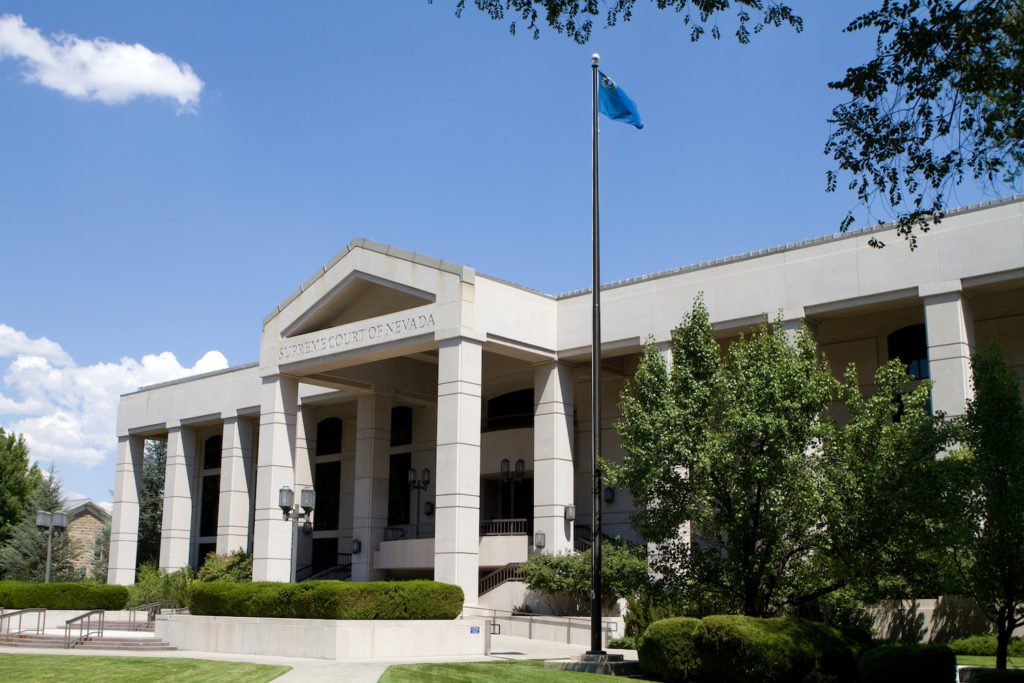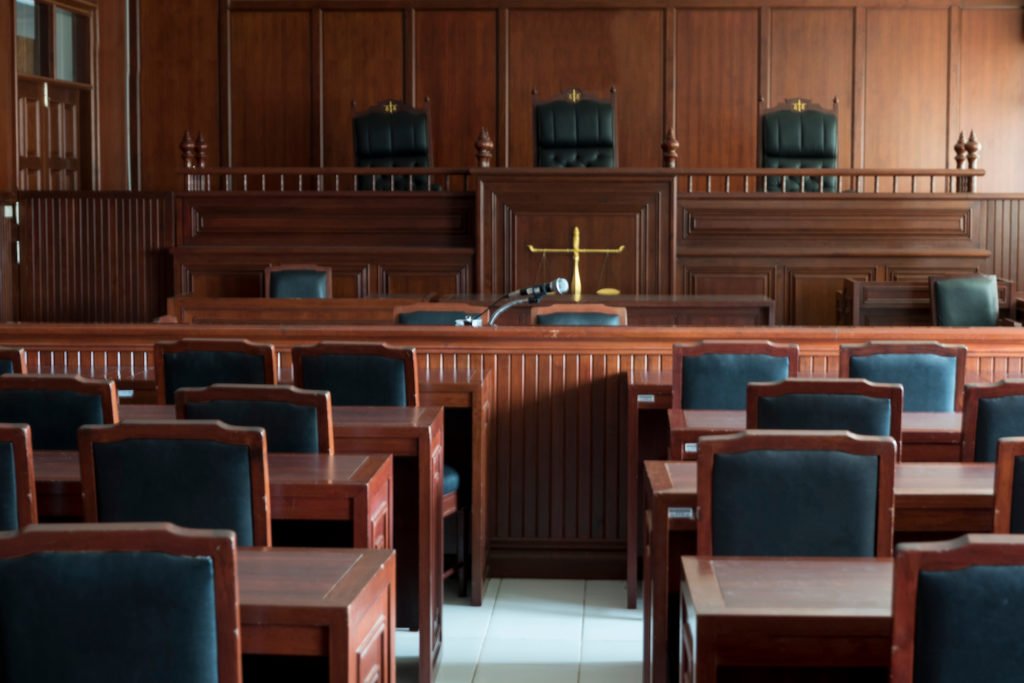Nevada defendants convicted of felonies or gross misdemeanors may appeal their trial verdicts to the Nevada Supreme Court. An appeal is not a retrial – the court is merely reviewing the trial record for “reversible errors.” Depending on the grounds for appeal, the court will then either uphold or reverse the lower court verdict and possibly order a new trial.
In this article, our Las Vegas criminal defense attorneys discuss:
- 1. What are appeals in Nevada criminal cases?
- 2. Which Nevada courts handle appeals?
- 3. What are grounds for appealing?
- 4. Can appellants introduce new evidence?
- 5. What is the appellate process in Nevada?
- 6. What are other options for post-conviction relief?

Nevada’s Supreme Court hears felony and gross misdemeanor appellate cases.
1. What are appeals in Nevada criminal cases?
An appeal is when a defendant challenges a court ruling by asking a higher court to review – and hopefully reverse – that ruling. Defendants in criminal cases may appeal:
- A guilty verdict,
- A criminal sentence (such as prison time and/or fines), or
- Judicial decisions (such as admitting prejudicial or unlawfully-obtained evidence into trial)
In short, an appeal is a request that a higher court determines that the lower court made a major mistake that needs correcting. Note that defendants who pursue appeals are called appellants.
2. Which Nevada courts handle appeals?
The Nevada Supreme Court hears appeals in all felony and gross misdemeanor cases. But about one-third of all cases filed get assigned to the new Nevada Court of Appeals, which is an appellate court one level below the supreme court.1
3. What are grounds for appealing?
The following are common grounds for appeal in Nevada criminal cases:
- The district court judge incorrectly applied a law or regulation (such as failing to sever a case when the joinder of multiple charges or co-defendants was prejudicial to the defendant).
- The judge made an incorrect ruling on the admissibility of evidence, which jeopardized the defendant’s constitutional rights to a fair trial.
- There was insufficient evidence to support the gross misdemeanor or felony conviction.
- The jury was given improper instructions on the criminal charges.
- The deputy district attorney engaged in prosecutorial misconduct during the trial criminal proceedings.
The Nevada Supreme Court decides only questions of law, not questions of fact. Questions of law concern whether the law was applied correctly. Questions of fact concern the truthfulness of evidence, such as the credibility of witnesses.2

Usually three Nevada Supreme Court justices hear appeals cases. In some cases, all seven justices decide the case (“en banc”).
4. Can appellants introduce new evidence?
No. Appellate courts do not hear testimony or retry gross misdemeanor or felony cases. They only review the transcripts and proceedings that took place during the trial. In short, appellate justices are searching for procedural and constitutional errors that occurred at the trial court.3
5. What is the appellate process in Nevada?
Felony or gross misdemeanor defendants who wish to appeal must file a notice of appeal with the judicial district court clerk within 30 days of the trial’s entry of judgment. Then the clerk prepares the record, which includes all the transcripts and proceedings of the trial. The district court notifies the defendant and prosecution once it files the record with the Nevada Supreme Court.
Once the record is filed, the defendant usually has a 120-day time limit to write and file the brief.4 The brief explains all the issues and arguments justifying an appeal. It also references relevant laws and cases to back up the arguments. Defense attorneys must raise every feasible issue and argument in that brief or else they may lose the right to raise those arguments later.
After the defendant files the brief, the prosecution may file an opposition. Then the defendant may file a reply to that opposition. Sometimes a panel of justices makes its decisions just from reading the briefs. Or sometimes it holds oral arguments where both sides have a half-hour to embellish on the briefs and answer justices’ questions.
Afterwards, the justices will discuss the issues among themselves. Then one of them will compose a written decision that either upholds (affirms) the trial’s verdict or reverses it. Depending on what the court finds, it may remand the case back to the lower court for a new trial.
6. What are other options for post-conviction relief?
Following a guilty verdict at trial, the defendant can file a motion for a new trial. Like it sounds, the defendant is asking the trial judge for a do-over. However, these motions are rarely successful; judges are hesitant to reverse themselves or admit they made a mistake.
Another option is to file a writ of habeas corpus, which is when the defendant challenges the legality of his/her imprisonment. However, defendants may not pursue this option until they have exhausted all other avenues, including appeals. One of the most common arguments defendants make in writs is that their trial suffered from ineffective assistance of counsel.
Unlike with appeals, Nevada law permits new evidence in both motions for new trials and habeas corpus writs.
Down the line, defendants may try to get their sentences commuted (reduced). Once the case is over, defendants may be eligible for a record seal after a statutorily-determined wait time – this prevents the case from showing up on future background checks. And finally, defendants can try to get their case pardoned, which is the only way to get gun rights restored in Nevada.
Note that defendants may not appeal their guilty pleas or nolo contendere pleas. But they may be able to file a motion to withdraw the plea.

Contact us for additional help.
We represent clients throughout the state of Nevada, including Las Vegas, Henderson, Clark County, Washoe County, Reno, Carson City, Laughlin, Mesquite, Bunkerville, Moapa, Elko, Pahrump, Searchlight and Tonopah.
Also see our related articles on arraignment, preliminary hearings, and jury trials.
In California? See our article on California felony appeals.
In Colorado? See our article on Colorado criminal appeals.
Legal References
- Currently, there are two Nevada Supreme Court locations: Las Vegas and Carson City. Note that county district courts handle criminal appeals of misdemeanor cases from justice courts and municipal courts. And federal court criminal cases in Nevada may be appealed to the Ninth Circuit Court of Appeals and then maybe the United States Supreme Court. Learn more about appellate federal law.
- See State v. Shade, 111 Nev. 887, 900 P.2d 327 (1995)(re. abuse of discretion).
- See Nevada Rules of Appellate Procedure; note that public defenders may represent defendants in the appeals process.
- Same; NRS 177; note that convicted defendants who are not sentenced to life must appeal using the “Fast Track” process. This means the brief can’t be longer than 15 pages. The justices may then ask for longer briefs if they think a more in-depth discussion is necessary. Conversely, defendants who are sentenced to life in Nevada State Prison have to file a longer brief and may not use the Fast Track process.

